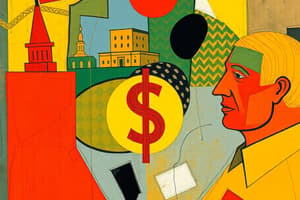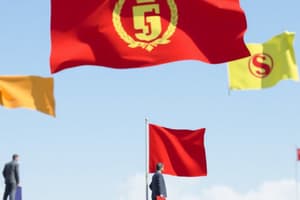Podcast
Questions and Answers
What is capitalism?
What is capitalism?
- Economic system based on barter
- Economic system with government control
- Economic system with communal ownership
- Economic system with private ownership (correct)
What system is characterized by lords, vassals, serfs, and fiefs?
What system is characterized by lords, vassals, serfs, and fiefs?
Feudalism
Who is a nobleman that owned land?
Who is a nobleman that owned land?
Lord
Who is a person that granted land in feudalism?
Who is a person that granted land in feudalism?
What is a fief?
What is a fief?
What is a serf?
What is a serf?
What marked a significant increase in food output during the 1700s?
What marked a significant increase in food output during the 1700s?
What is a corporation?
What is a corporation?
What is limited liability?
What is limited liability?
Who is known for the idea that competition maintains economic cohesion?
Who is known for the idea that competition maintains economic cohesion?
Who suggested that piecework payment depersonalizes workers?
Who suggested that piecework payment depersonalizes workers?
What theory did Karl Marx propose about capitalism?
What theory did Karl Marx propose about capitalism?
What does alienation mean in a capitalist society?
What does alienation mean in a capitalist society?
What is socialism?
What is socialism?
What political ideology envisions a classless society?
What political ideology envisions a classless society?
What does the income effect refer to?
What does the income effect refer to?
What is a family wage?
What is a family wage?
What does the service sector involve?
What does the service sector involve?
What does Champagne Glass Distribution represent?
What does Champagne Glass Distribution represent?
What does 'parceling out of the soul' refer to?
What does 'parceling out of the soul' refer to?
What constitutes a monopoly?
What constitutes a monopoly?
What is oligopoly?
What is oligopoly?
What does offshoring mean?
What does offshoring mean?
What is a union?
What is a union?
What does union busting refer to?
What does union busting refer to?
Flashcards are hidden until you start studying
Study Notes
Economic Systems
- Capitalism: An economic system based on private ownership, where market competition determines prices, production, and distribution of goods.
- Feudalism: A pre-capitalist system with lords, vassals, serfs, and fiefs; characterized by land ownership and obligations between social classes.
Social Structures in Feudalism
- Lord: A noble who owns land and has power over the territory.
- Vassal: A person granted land by a lord, obligated to provide protection and service in return.
- Fief: The land held by the vassal from the lord, from which the vassal can reap harvests and provide military service.
- Serf: A laborer bound to the land, who protects the lord, can own property but cannot be sold.
Historical Developments
- Agricultural Revolution: Occurred around 1700, introducing new farming techniques that significantly boosted agricultural production.
Business Structures
- Corporation: A distinct legal entity separate from its owners, affording legal personhood to facilitate business transactions and liabilities.
- Limited Liability: Protects shareholders from being personally responsible for business debts beyond their investment.
Economic Theorists
- Adam Smith: Advocated for competition as a unifying factor and emphasized the efficacy of monetary systems over barter.
- Georg Simmel: Noted that piecework payments depersonalize labor, granting workers freedom and increasing leisure time by separating work and private life.
- Karl Marx: Critiqued capitalism for causing alienation among workers; believed it would ultimately lead to its own downfall and transition to socialism and communism.
Concepts of Alienation
- Alienation: A state where individuals feel disconnected from the products of their labor, their work processes, fellow workers, and their inherent human nature.
- Parceling out of the soul: Describes a disconnection from moral values and human relationships, impacting individuals’ sense of identity.
Economic Systems Variants
- Socialism: An economic model focused on meeting the population's needs through non-market distribution methods.
- Communism: A political ideology aiming for a classless society with state ownership of production, distributing rewards based on need.
Economic Theories and Effects
- Income Effect: Higher wages can impact decisions regarding the opportunity cost of working.
- Family Wage: A wage structure aimed at ensuring sufficient income for workers to support families.
Economic Sectors
- Service Sector: Part of the economy dedicated to providing intangible services, contributing significantly to employment.
Income Distribution
- Champagne Glass Distribution: Illustrates the uneven global distribution of income, resembling the shape of a champagne glass.
Market Structures
- Monopoly: A market condition where a single seller dominates, stifling competition.
- Oligopoly: A market dominated by a few firms that control market resources and pricing.
Business Practices
- Offshoring: The practice of relocating part of a company’s operations abroad to reduce costs.
- Union: An organization formed by workers to negotiate collective bargaining and protect their interests.
- Union Busting: Targeted efforts by companies to undermine or dissolve workers' unions.
Studying That Suits You
Use AI to generate personalized quizzes and flashcards to suit your learning preferences.




